A simple Muscovite Levelord: an interview with the creator of Duke Nukem
RUVDS together with Habr continue the project, consisting of a series of interviews with interesting, in our opinion, people in the IT environment. Last time, we met with Boris Yangel, the main “brain” of Alice in Yandex.
Today we present to your attention an interview with Richard (Levelord) Gray. Levelord is the designer of the legendary games Duke Nukem, American McGee's Alice, Heavy Metal FAKK2, SiN, Serious Sam, the author of the famous phrase "You're not supposed to be here." Richard was born and spent most of his life in the United States, but a few years ago he moved to Moscow with his Russian wife and daughter.
The interview was attended by Habra editor Nikolai Zemlyansky and RUVDS managing partner Nikita Tsaplin.
→ The English version of the text and video here is
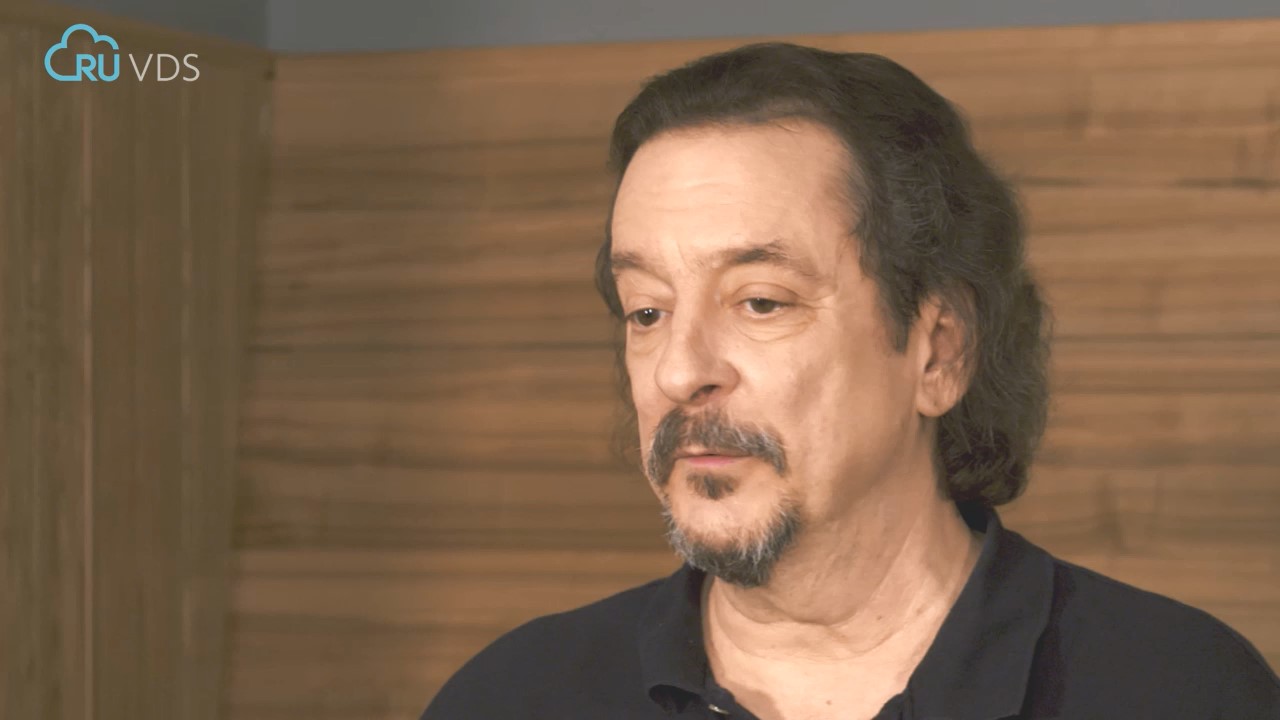
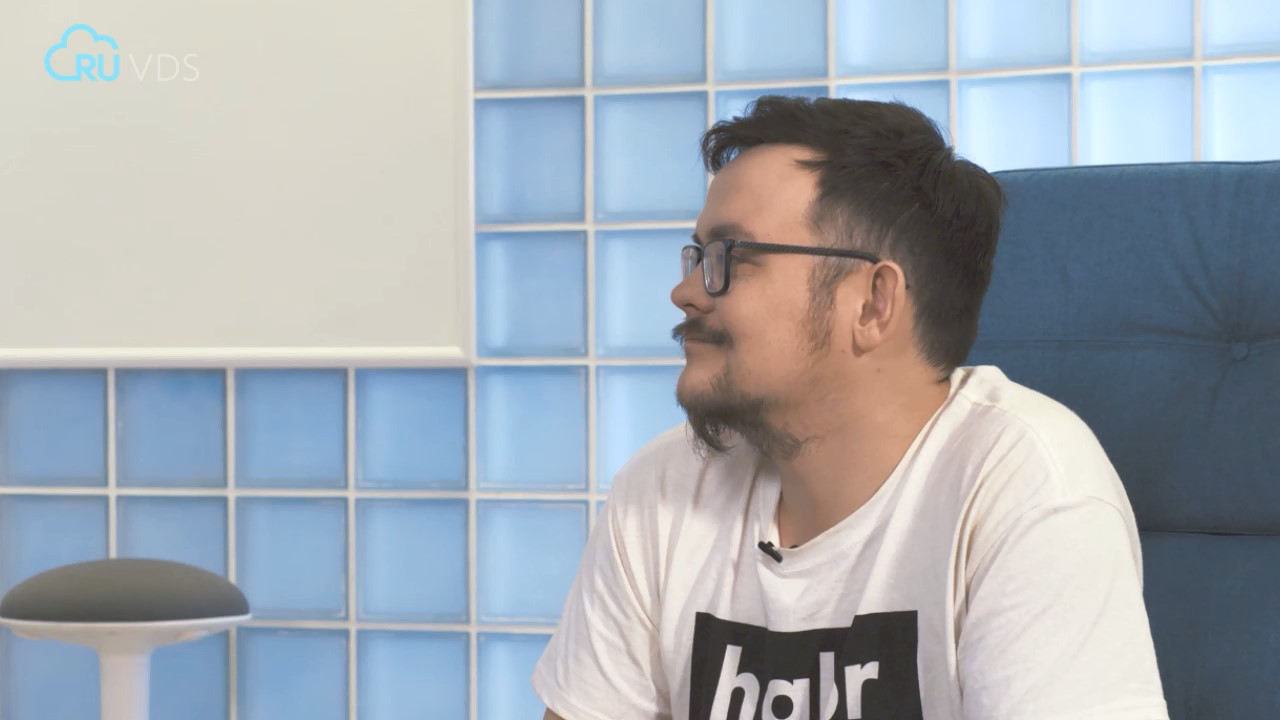
Nikolai Zemlyansky, editor of Habr.com:
Richard Gray:
Hi.
Well, I only helped with Alice, this is a Rogue Entertainment game. Some Ritual employees assisted in development during the latest crunches. But it was their game, I only helped when it was necessary. As for Croteam - I never did anything for them. And they, in my opinion, made the coolest game in general. There is nothing but shooting and killing. No gadgets that began to appear in games then. Many guns, many ammo, many monsters. I told them this, and they put my quote on the cover. That's all I did - they made the whole game.
Of course, Duke Nukem is the first game I worked on. After so many years, she remains the same game. People don’t remember me, my name, but when I say “You're not supposed to be here”, they immediately: “Yes, this is the same dude!”. So Duke Nukem is my biggest and best work. And the most fun, besides.
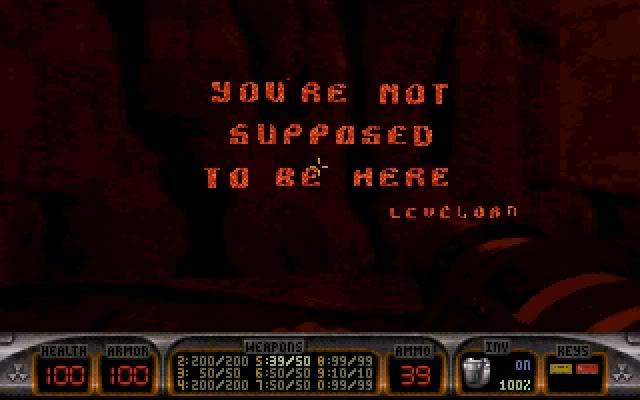
For me, it all started at the dawn of the 80s. I did business programs for companies. Then computers used old computer cards. You write a line of code on the map, put it in the car, write it, put it in it. Punch cards. What was happening was monitored using a simple terminal. The company where I worked bought the new HP mainframe - it was a big step forward.
There were portable disks and a monitor for every employee, including programmers - me and my boss. They bought a new Hewlett Packard mainframe, and I found a games folder there.
Among them was a game that is known as Adventure, but in general it is called Colossal Cave Adventure. It was a simple text quest, where they told you: you are in the room, the door is on the left, the door is on the right. And you chose to go right or left. Found treasures, lost in levels. It was then that I was hooked, I thought that I should do just that.
Then everyone was playing arcade machines, and Nintendo had just released its console. These were simple little games with pixel graphics. I wrote my own text quest in COBOL, which was used for business. Using ASCII art, I also made poker. But I knew that I could not seriously make computer games - for this you need to write game engines, which requires a lot of knowledge. So I went to the university to the faculty of computer engineering - I thought that this would help.
Six years later, I graduated from university and realized: knowledge is still not enough. He began to make software in one rocket and space company. Two years after this, Wolfenstein came out. It was a sensation: the first first-person shooter! A year later, DOOM came out - just a fantastic game that everyone knows about. The key point for me was the release of the DEU utility - Doom Editing Utility - which allowed everyone to create their own levels of the game. Id thought it was quite normal. You could go in and start making your own levels.
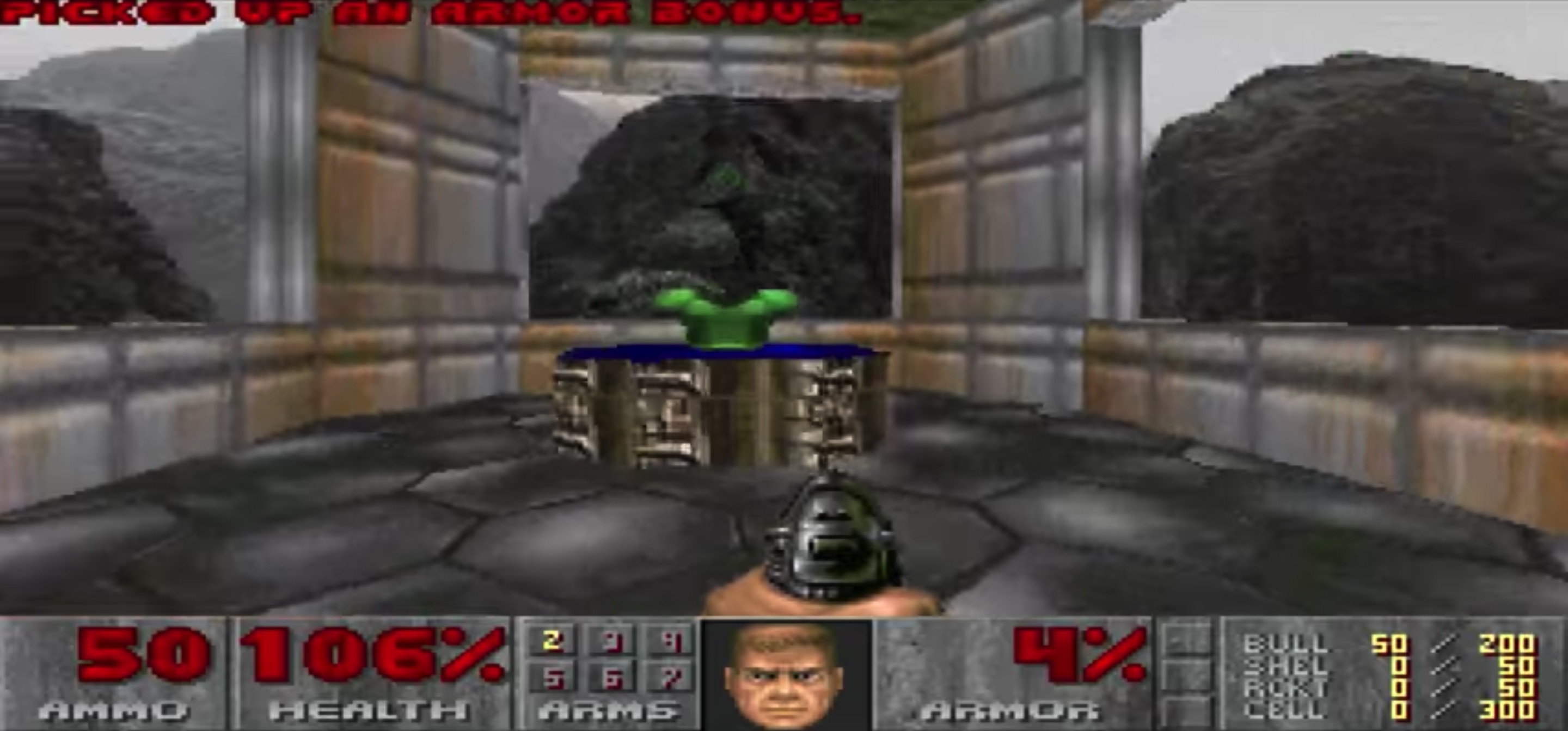
I went to the first level of the game. There you find yourself in a room with a window onto the street. You can look out of it, but you cannot get out - the window is too low. In the editor, I enlarged the window and then in the game I went out through it to the street. Oh, at that moment, as if the Lord had descended upon me! I could not believe what was happening. And so I realized that, although I can’t program, I can do such things!
The people who made the games — John Romero and others — called it level design, but there was no such thing to other people. I realized that I want to do just that. I spent all my free time - it was a real passion. I spent all free time from work on the levels, nights and weekends on level design.
Oh, I remember that story with a laugh. By that time, for 10 years I wanted to make games, then decided that I couldn’t. But then the level design appeared - and it ignited me. If I hadn’t been hired as a game dev, I would still be able to do levels and game content, even for free.
But I had to try. I did four levels that were well rated on the CompuServe forums. I wrote them to a floppy disk, printed a letter on paper, put everything in an envelope and sent it by mail. Then there was already an e-mail, but progress has not yet reached the sending of files. I sent a letter to Jay Wilbur, CEO of Id Software. I was sure that they would not even open the envelope, because they received thousands of fan letters.
After about a week or two, I returned home from work and saw that there was a message on my phone. You know, there were such phones with a film and a light bulb that lit up when there was a message on the film. I picked up the phone to listen and almost crap: "Hello, Richard Gray, this is Jay Wilbur." Holy cow! I could not believe it.
I wrote to him what a cool Doom game, what a cool engine she has, and that if they took me to the team, we could make a version of Doom for World War II or some other. Now we know that this is only a replacement for skins, but then few people did it. Jay thanked me, said the ideas are great, but they can't do it.
Such an answer only added me enthusiasm. By that time, I was already working on the levels of the game Blood, was one foot in game dev.
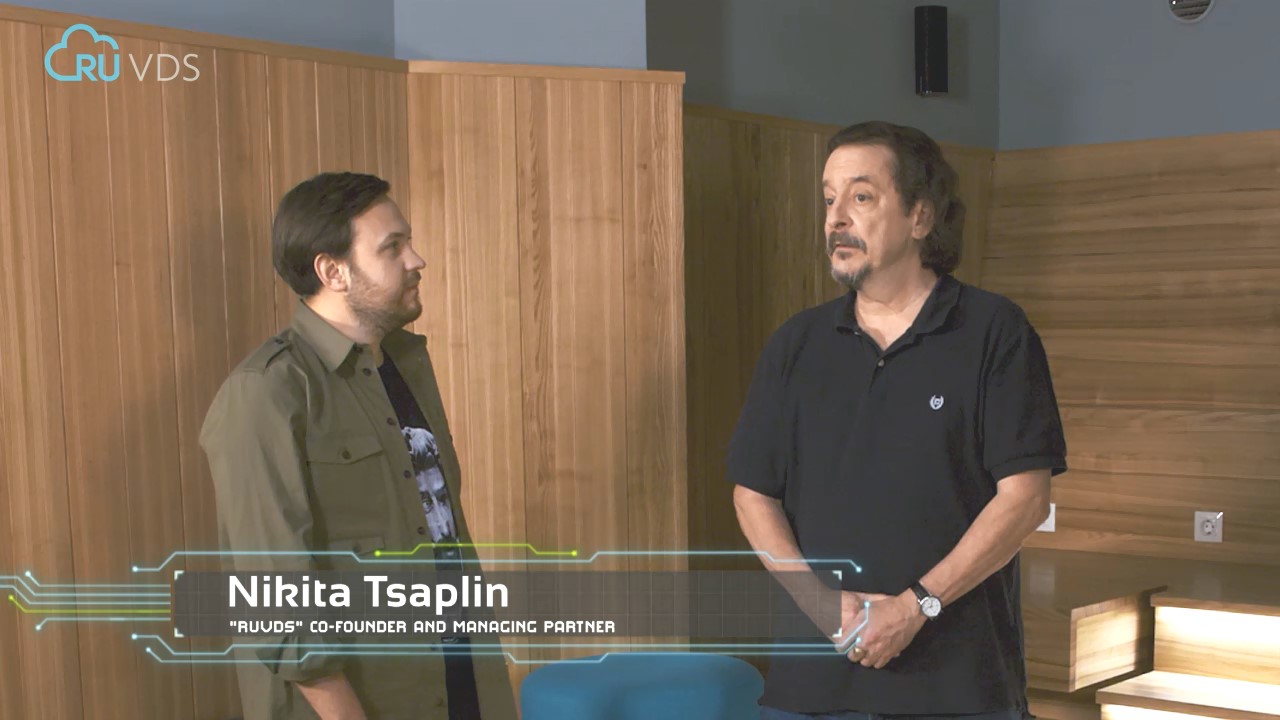
Nikita:
As far as I know, now everything is the same as then. All work in crunch mode. You work all day, work on the weekend. I was absolutely immersed in games, like my colleagues. At the same time, some had families! The working day began quite late, at 9-10 in the morning.
Yes, as with developers, it was essentially the developers. They remained in the office until 10 pm, sometimes until midnight, they used to sleep in the office. Or rushed home, turned off for several hours, got up, took a shower and returned to work again. This could go on for a year and a half - this is the development cycle of a regular game. And the closer the end of the cycle was, the worse things got - people spent whole weeks without leaving the office. It was easier to take a nap at the workplace than to go home, then back. Cruel, but quite common for game dev. But at the same time, making games was still fun.
As far as I know, everything was the same. We also had small teams. Duke Nukem's core team consisted of 8 people, and another 4 to 8 people worked from time to time on contracts. All levels of Duke Nukem were made by two people. Today only twenty people can work on one level. Yes, I miss those times.
No, I'm not the first to make Easter eggs. In games, they appeared in the early 70s. John Romero is very famous for his Easter eggs, hidden things. In DOOM, they are everywhere. And so did not only John, but many other level designers. But for some reason, “You're not supposed to be here” ... I did it and I don’t know why ... I once spoke with two people, even before they began to recognize me by their mustache and long hair. One says, “This is Levelord.” "Who?". “Richard Gray, Levelord” - “Who?” - “You're not supposed to be here.” “Ahhh, that one!” I don’t know how it happened. Allen had no less than Easter eggs, he hid them everywhere. But for some reason it turned out as it is.
Films were once popular, where actors played their roles, and suddenly one of them looked at the camera and winked. At the same time, they understood that they played roles in the cinema. Maybe it’s the same here, and I, the level designer, say: “I know that you are here, I know that you are not in the real world.”
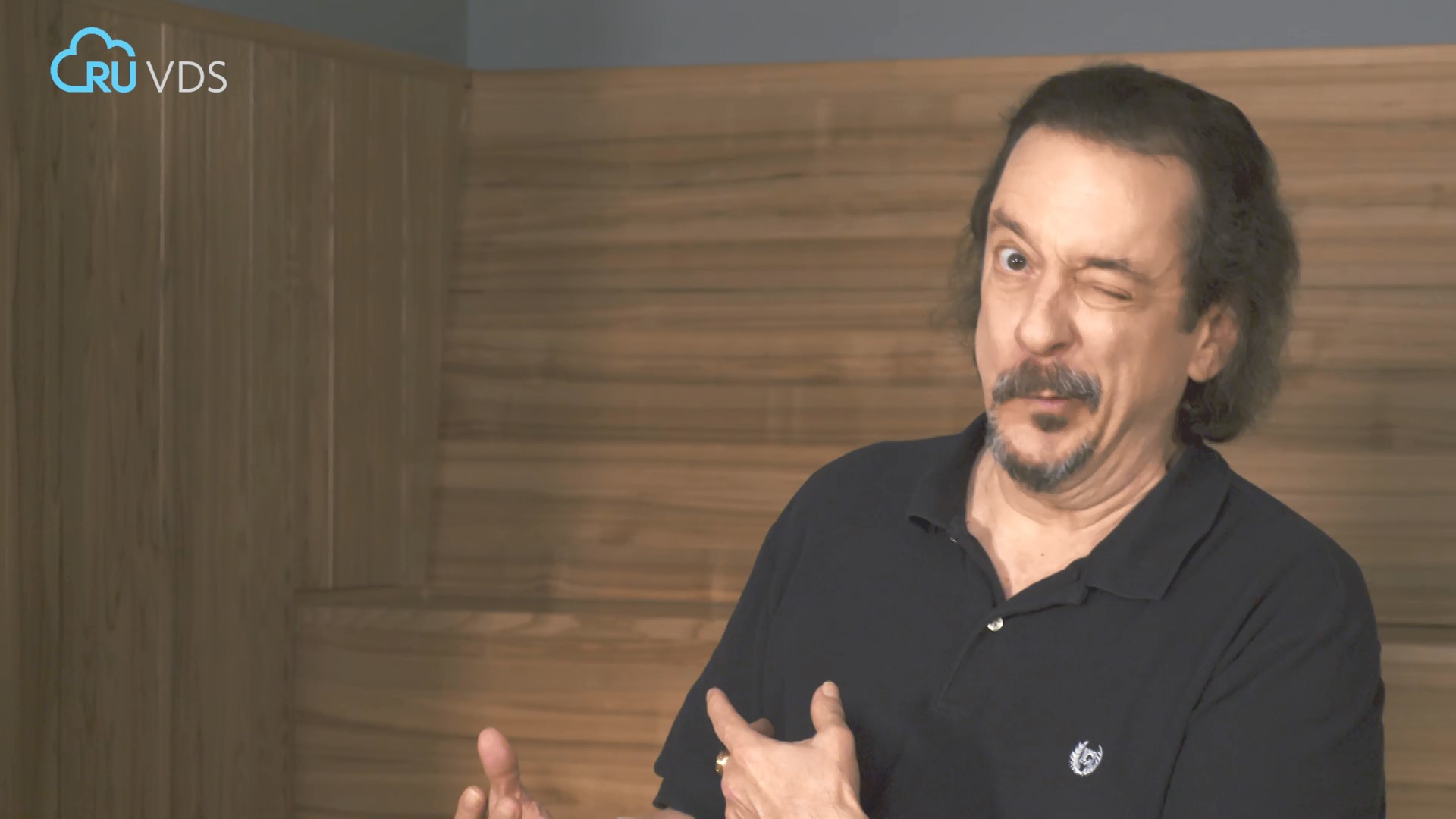
Yes, you break through and find yourself next to the player, the way it is.
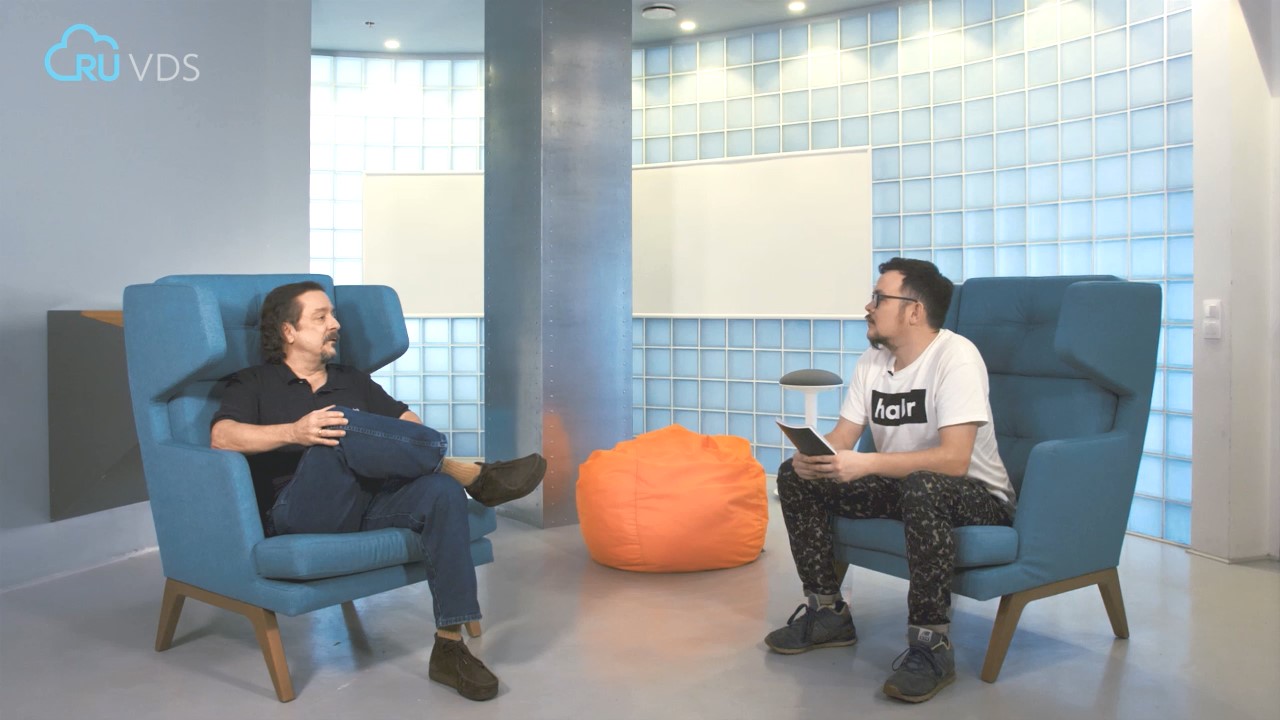
Nikolay:
It all starts with an idea. Then you draw diagrams and other things to fix everything and explain to colleagues what you want at all. Then you make a very simplified version of the level, without lighting and with a minimum of textures. On it you check the gameplay, the player’s path, which is good, what is bad. Then you make light textures, you work out scenes. Did you mean the process of creating levels or how to come up with a level concept at all?
This may sound like “captaincy,” but the level should be fun. This is the only thing to worry about. There are so many ways to make a level or game fun that you cannot give a more accurate description. At the upper level, the game should be fun, and at the lower level, it should work fine. If your game is built on hi-end technologies, then not all computers can stretch it. You need to think about frame rate. A game that progresses a few frames in a second cannot be fun.
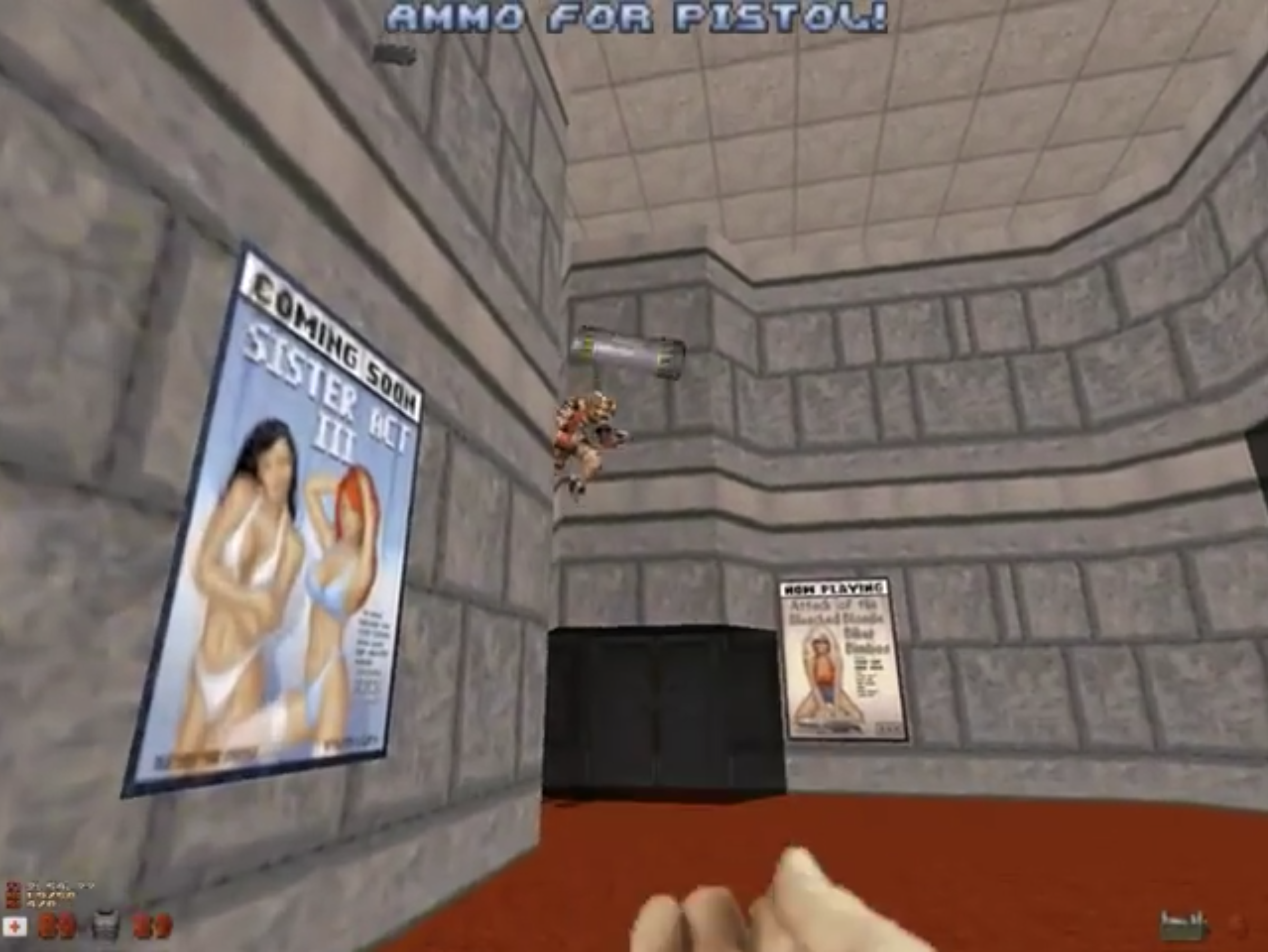
But if you move away from technology ... I have two excellent, two best examples. The first is Tetris, a very old game. She's pretty darn simple, but still popular. I still play it. The second example is Angry Birds. Her "fun" mechanics are nowhere simpler. This is the simplest physics: you throw some objects, because of which others fall. Great level design. And this is not a dumb game in its simplicity. The developers have created the simplest mechanics that make levels fun. I can’t believe that there are Angry Birds-style underwear, Angry Birds animated series, Angry Birds soda. This is a great game.
Games should be fun. There are many ways to achieve this, depending on the genre of the game. If you make a shooter, as I once did, then this is like an action movie. The game usually consists of three parts - episode I, II and III. The game slowly accelerates, moves to the main action and tension, reaches its highest point and ultimately leads to victory or defeat. But in any case, the player is satisfied. If you lose, then come back and try again. If you win, you only think, “Oh my God, they didn’t dunk me!” The whole game is divided into three episodes, and each episode has the highest point - crescendo.
Each level is built in the same way. Sometimes you violate the order of things and throw the player immediately in the midst of a battle. But usually everything works as I described before. Many parameters are involved here. For example, balance is when a player passes a level, and you know that he has enough equipment, health and hassles with bad guys. You do not make the game too simple or too complicated. I often saw games in which the player wanted to fool. The developers thought about how great they did it. But the players did not like to be deceived. They wanted balanced gameplay.
I compare the game level with the restaurant. There should be a delicious meal, but the restaurant should look beautiful. If it's a Japanese restaurant, it should look like a Japanese restaurant. And the dishes should look good when they are served, create a pleasant impression even before they are tasted. The same with game levels: they should look good, you should feel that you are inside. If I make a level in Los Angeles, the player must feel that he is in Los Angeles. Or inside the apocalypse. All things must be combined.
I'd always been the best. They themselves knew this, and therefore, I think, they did not feel any competition. They were always open, ready to help.
I remember the day when only a few months were left before the finish of Duke Nukem, and we had excellent expectations about the game. I don’t know if this can be called crunch now - I haven’t been working for 10 years. But then we worked every hour to keep the deadlines and finish the game - the faster the better.
We did not have time for socialization, but that very day the opportunity turned up - I don’t remember how - to go to Id Software. At that time, we already knew that Duke Nukem would be a good game. We went to Id and John Romero called us: “Oh guys, you must see it!” At one level of Quake, he turned on god mode. He stared one way and summoned the shambler - a big monster from Quake 1. He came up from the back, and we saw his shadow. It was real 3D modeling, not sprites. At first I thought, “Oh, how cool!” And then: "Oh hell, Duke Nukem should come out ...".
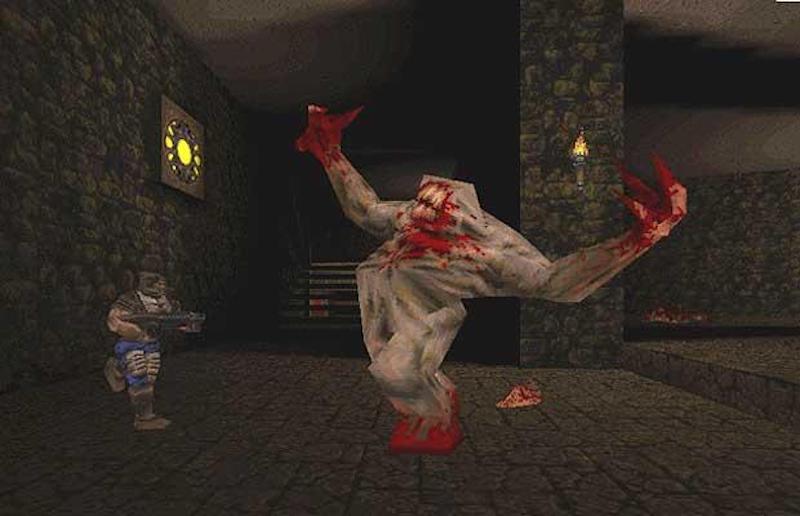
In Duke Nukem, Allen Bloom and I had a different story. If I wanted the floor to look highlighted, I had to redo the texture. We did not have light sources, we had to do everything manually. In Quake, it was enough to put a light source, and he did all the work. The transition from sprites to full 3D is, of course, cool, and John Romero is a great professional, but at that moment I had a different, simpler thought: “Damn it, I'm sitting with John Romero in the Id office, and he shows me Quake level! ” And the second voice said: "Richard, your Duke Nukem merges."
Yes, this happened often, and you could not do anything. For example, in Duke Nukem you only have one floor, you cannot put two floors on top of each other. But Allen Bloom found a way to outwit the game engine. In the first level, Hollywood Holocaust has a spiral staircase that leads to a room with a projector. With her help, Allen found a way to place the floor above the floor until you see both floors at the same time. Overcoming these limitations has helped Duke Nukem stand out. You thought: hell, this is the floor above the floor, it should not be so.
We did levels with a similar trick. For example, here is a room, and in every corner of it there is a hole down. You jumped into a hole and ended up in a room of the same size, but made in a different theme. And around this room there was a corridor along which you could go, see the first room, then the second room. She looked different, but was in the same place. And the whole room was four. And you fell into every room, which looked crazy from the side of the engine. The engine did not know how much, but could do such things.
No, I can’t, I came to the industry too early. I remember people, companies ... many of them were great, just fantastic. Here I want to go back a bit and remember Adventure - the same text quest that sowed my interest in games. At the university, I bought a Commodore 64 and several games - including Ultima IV, made by Richard Garriott. Started to play it. I had a pretty good GPA (GPA) - not perfect, but good. Six months before graduation, I started playing Ultima IV and my GPA began to slide. I could not stop and played: another level, another level ... By the time I graduated, I could barely meet the minimum requirements in terms of average score. And all because of one game.
I have met Richard Garriott several times. Yes, he lives among us, but for me he seemed to come down from heaven.
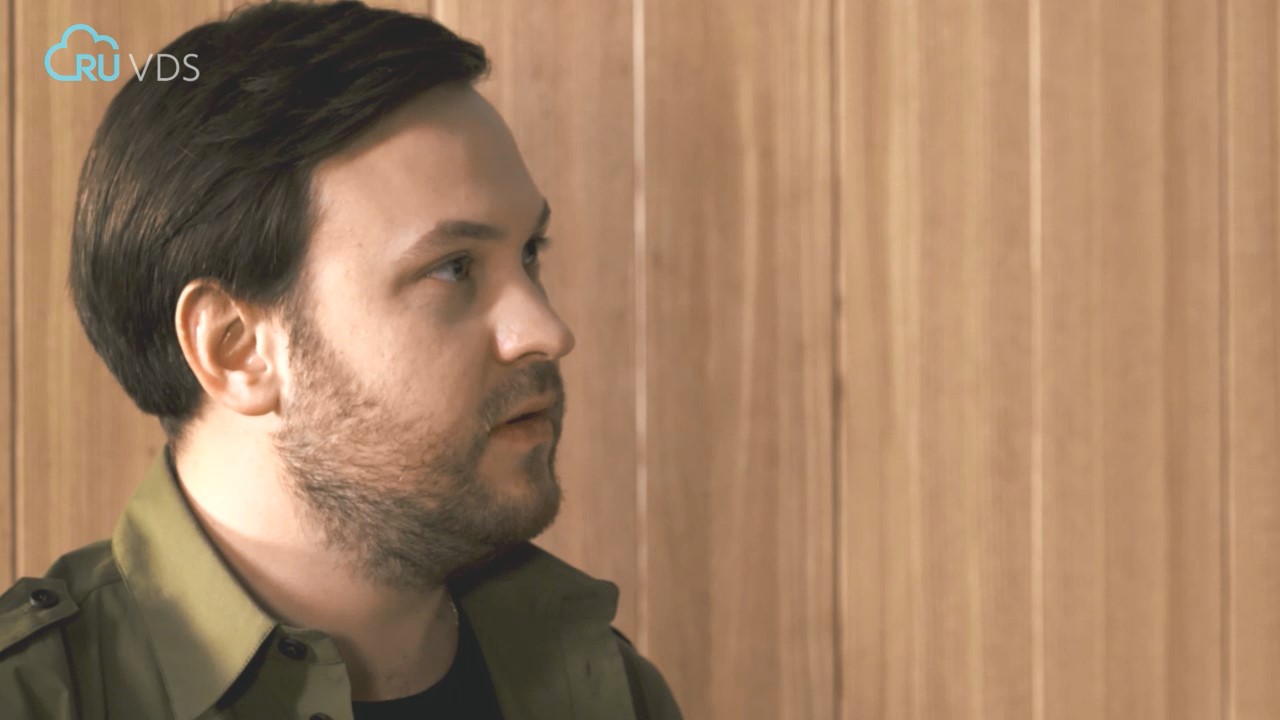
Nikita:
I do not know what to say. We just made Duke Nukem, and it was barely released by the time we left 3D Realms. We thought it was a great game, but we couldn’t say for sure. We just wanted to reap the fruits of our labors. I started a star fever. I thought that I was magnificent, that I was the best and I was not well treated in 3D Realms. So I left with the other guys in my company.
When you are the boss and you have your own company, you cannot do what you want. Past experience did not help me. Making Duke Nukem was awesome, and we wanted to continue that way. My first job at Ritual Entertainment was a set of levels for Quake. He received very good reviews, and we had fun and interesting to do it. Duke Nukem only taught us how to create games, he had nothing to do with new works.
You constantly say that I was alone in Ritual, but there were six of us. And all were the owners of the company. At first, in addition to the owners, there was no one in the state at all. I was a simple level designer, I did not start a company. It was created by four people who left 3D Realms before the rest. I came later. I was glad that I was not burdened with management and responsibility. We had a CEO who was responsible for the business.
Yes, it was. I am a bad manager, we had guys who do it much better. I do levels well, and that’s it. And I think everyone will agree that six owners from one company is a bad idea. It is like a ship with six captains. Or six popes. Only one is needed.
No, I’m a very poor leader and manager, I work terribly with people. I don’t think that I will ever create a company again. I myself am a company: I am a leader, I am a subordinate - there is only me. Three years when I myself made indie games - it was wonderful. No meetings, documents, meetings, rules. I did everything related to levels and art ...
No, I will never create a company again. Until someone comes to me and says: “Richard, here are five million dollars, do what you want, just create a company.” Then I will create a company. But this will not happen.
It has become too difficult for me to play and create games. I love first-person shooters. For me, this is a game where there is equipment, health and bad guys who want to reduce it to zero. That's all. That is why I loved Serious Sam so much. You had about five buttons on the keyboard and a mouse. No gadgets and other tricks that you need to use to do one thing, find another ...
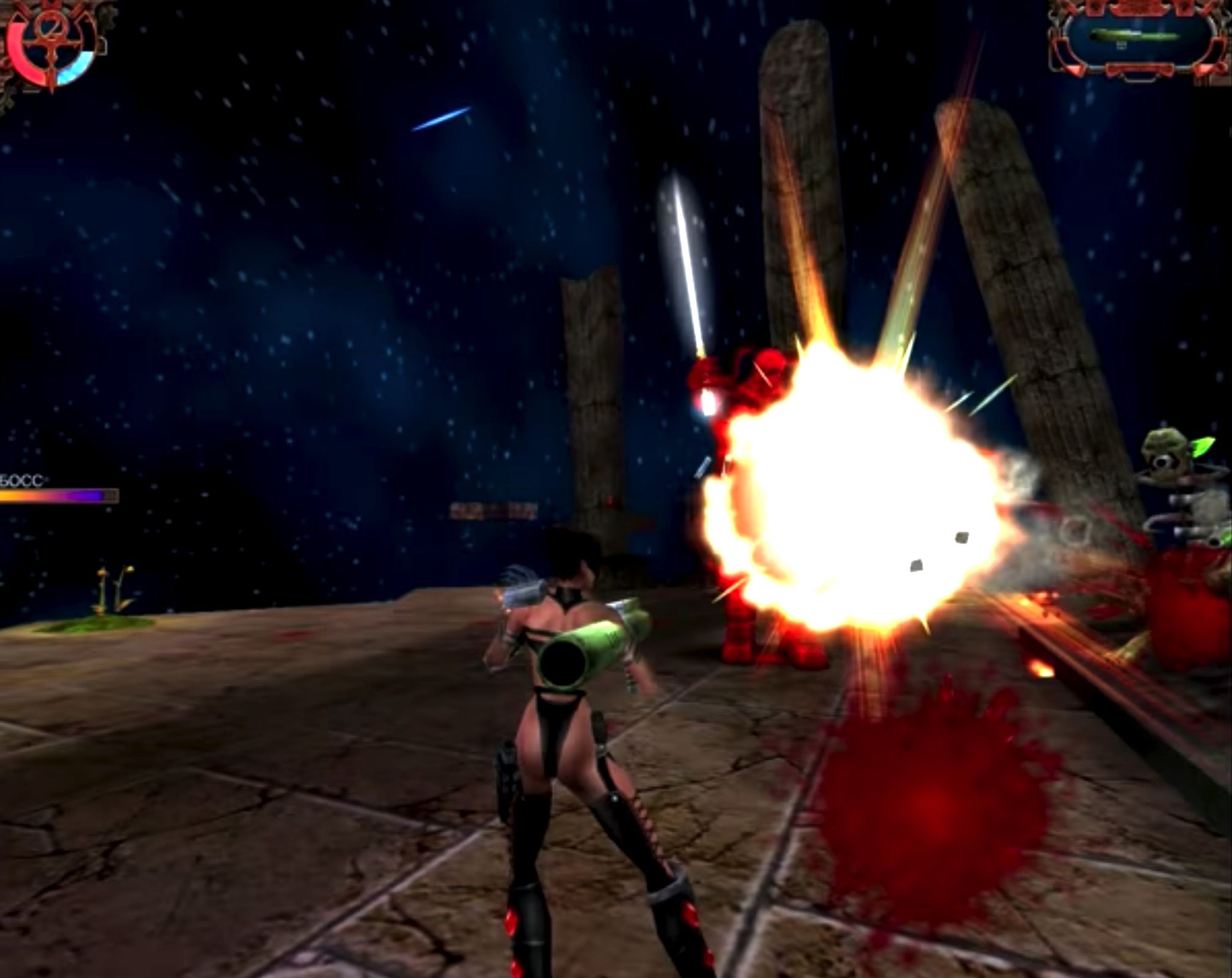
The same thing with the development of games. Previously, the level was entirely made by one designer. Now there are five, ten ... and everyone is doing the same level. Artists, lighting specialists and so on. And this is not because someone wants it that way - it just became a necessity. But this alignment did not please me.
I almost did not spend money. I was alone, I had a 20-year-old car, the house was already bought out. I estimated the budget and thought: “Hmm, I have enough money to live another 20 years.” I was also 20 years older than almost all my fellow developers. I was already 50. And I thought: “No, I’m tired, I’d better go home to make my games and, in general, whatever I want.” So did.
Yes, it was in Dallas. Several developers — Genell Jackhews, John Romero, Tom Hall, and others — volunteered to help start the program. I answered questions on level design, Janell Jackays on art direction - in general, we helped them at the start. It was fun to watch the director prove to the administration: “Yes, of course, we will make money on it!” Then we seemed to have planted a time bomb, which then detonated the acceptance of applications for training.
Level design. All you need to know to make levels. The most important thing you cannot learn at home is how to do something in a team. And it doesn’t matter what exactly you study. It is very useful. I can sit at home alone and do levels, but I have no idea how to sit next to four other designers who also make my level. You need to understand that this is not my level, this is the level of the game. Classical education helps a lot here.
Everything is different here, as in universities, where they give you a test in physics, mathematics, and you have to give the correct answers. You make a level and show it. And you do not just do the level, you work as a team. There is a class of level designers, an art direction class, programmers, game designers ... They all come together in groups, and each group makes its own game, as far as I know. I think there are some tests as well.
When you go to study, for example, as a chef, you don’t write any tests. You cook food and show it: here, I can do it. With gamedev, everything is about the same.
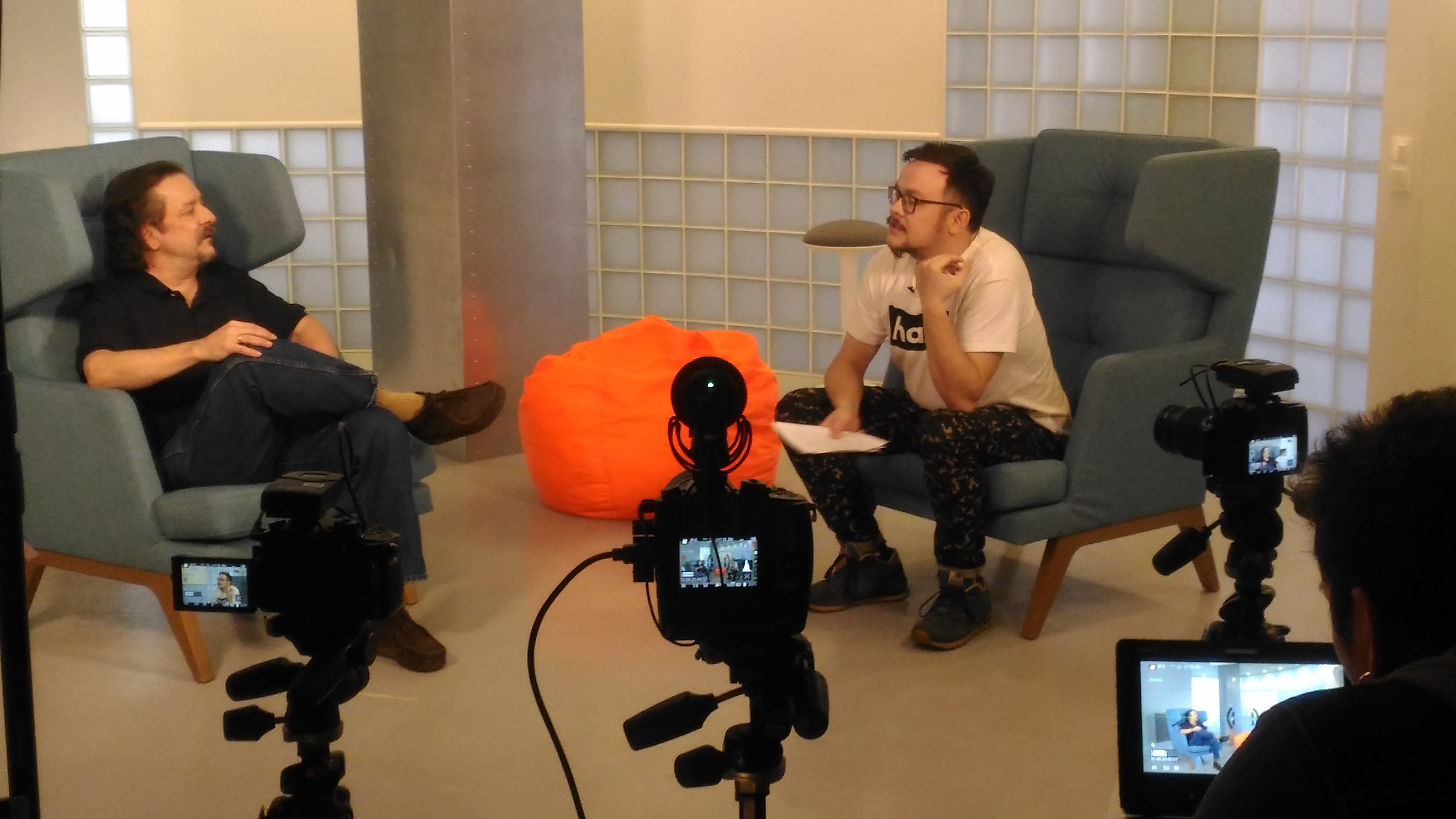
Nikolay:
Do not say Gearbox ( explanation: Gearbox Software is the developer of Duke Nukem Forever ), but I would do it for free. 20 years after the original Duke, Randy Pitchford made a deal with me and Allen Bloom, the second level designer at Duke Nukem. Lee Jackson made music, other people from the original composition of the developers also gathered - I do not remember all the names. We used the same Build engine, but already supplemented with 3D capabilities, with realistic dynamic lighting and other things. And those who want to nostalgia can play in the mode with the old version of the engine. Allen and I created levels for about a year, part-time. He did 4 levels, and I did 4 levels. From them was made a new, fifth episode of the game.
We decided to prepare a world tour of the cities that needed to be saved from aliens. Of course, I chose Moscow as the first city. And he chose ... all of his locations were in America, with the exception of one in Egypt. Los Angeles, San Francisco ... And I traveled to Europe. There was a strange feeling. We made the original Duke for a year and a half, in crunch mode, without interruptions. Some part of my brain just burned out while we were doing it. It was fun, but very difficult. And so 20 years have passed, and I'm sitting in Build again.
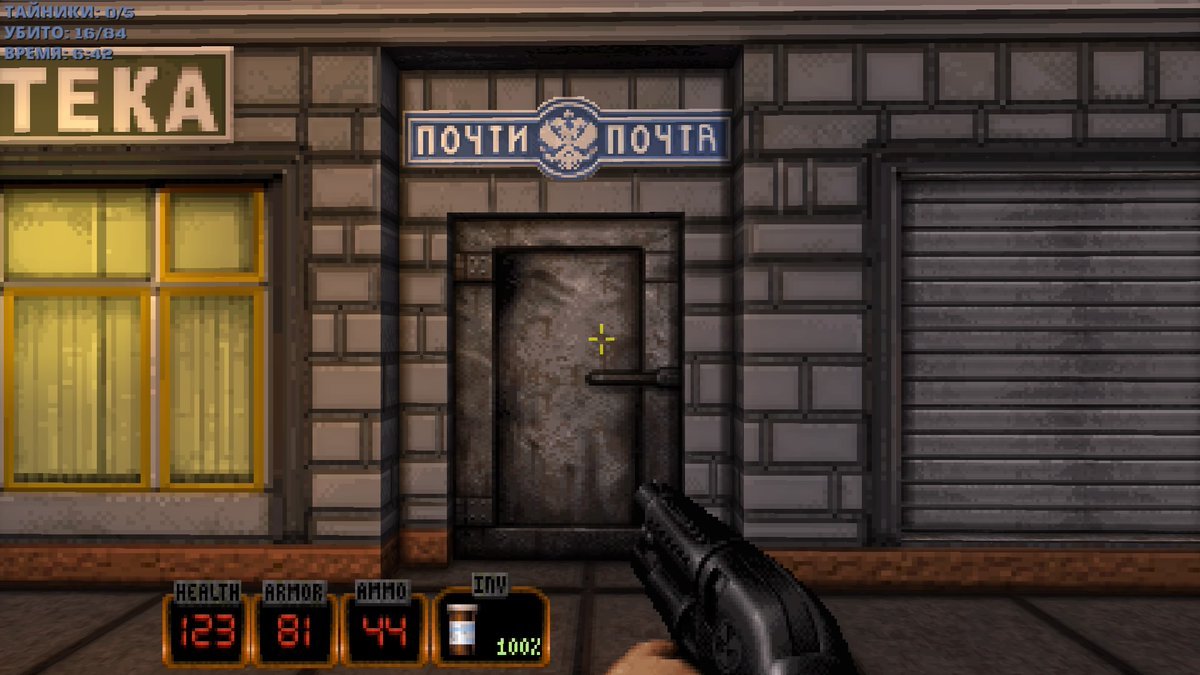
Allen has always been smarter than me. I usually asked him questions: "Allen, how do you do this?" Allen was sitting on the right, and I constantly turned to him. And after 20 years, sitting in a Moscow apartment, I caught myself thinking that I want to look right again and ask Allen about something. Allen in California is busy with his levels, I am in Moscow with his own, but the habits of those years tightly stuck in my head.
Previously, it was necessary to limit yourself, not to bend with sprites, level geometry. Now, working on the Build engine, you can do whatever you want. Modern computers with Build are bored, they just yawn and say: "Well, come on ..".
It was great, I had a lot of fun creating a new Duke. I have not heard anything about the sales of this game. It is on Steam, Xbox, Playstation. I expected a blockage of letters, ringing fanfare, but this did not happen. Perhaps because the technology is already out of date. Gamers know about Duke Nukem. Perhaps here is the same story as with the films. I love old films, black and white, made before my birth. But many people will not watch them precisely because they are black and white. But anyway, it was fun.
Yes, I helped design companies. When I just retired, back in Dallas I made two games with hidden objects, completely by myself. And it was a great time: no meetings, trips to work, no documents, schedules, deadlines. I could only think of games. They weren’t very cool, but considering that I did them alone ... I look around and say: "Well done, Richard, good job." And these games even brought me good money. Then my mother fell ill for a whole year. She’s better now, but then I helped her with rehabilitation and put off all things. And then bam! - and I'm already in Moscow, with my wife and daughter.
I am retired and do not do anything related to work. But sometimes I play with Unity and Unreal, I make some prototypes, purely for myself. This is my first time making an Android game. I never thought that I would do mobile games at all. I didn’t really like the platform. The screen is small, I'm old, I can’t poke my fingers fast enough. But now I think: hmm, but there is something in it. I go down the subway, go outside - people everywhere play on phones.
Now I almost do not help anyone with games. A friend of mine owns a Game Garden mobile game development company, I have helped them several times with time management games. I helped another friend with a bubble shooter. But in general, nothing serious, no development of your own game. Although ... we'll see.
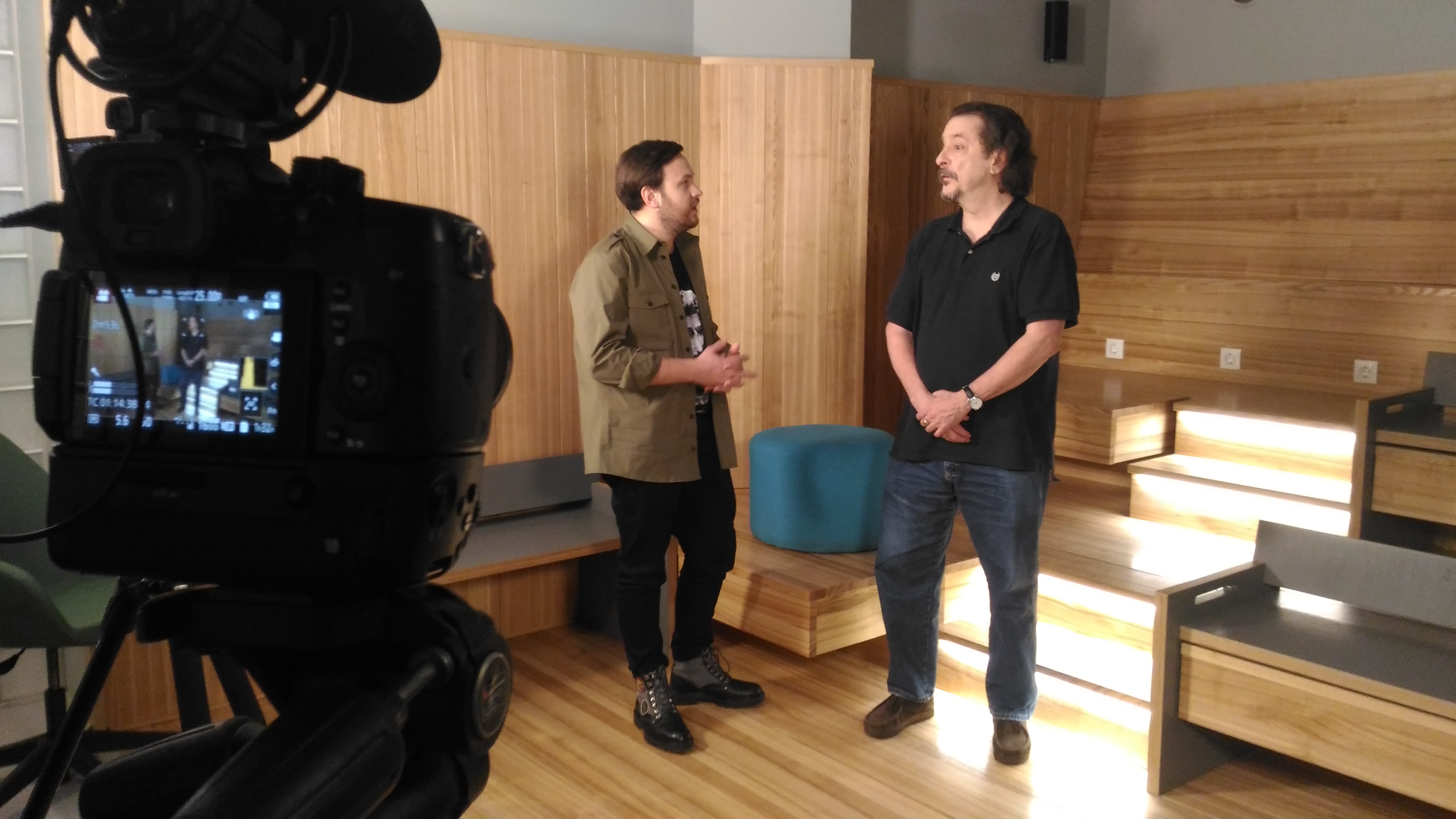
Nikita:
Oh, I am often asked such questions, especially in America. And I can not choose something specific. The only thing I don't like is winter. She is very harsh. But everything else ... imagine that I left everything in my homeland in the States - family, friends. Every day I miss something that I have there. Not because there is something missing, but because here it is different, unusual. But there must be a reason why I am here? I like everything here. Russian people are super. There are, of course, bad people everywhere, but in general ... I love Russian food, I have gained 10 kilograms since I moved here.
I love Moscow. New York was my favorite city before moving, and Moscow evokes the same emotions. Not a dirty and evil city, but old and very busy, just boiling. I can’t single out one thing, in Russia I really like everything. And I would like more Russians and Americans to travel to each other. Some Russians tell me: “Oh, you are cute, American.” Yes, Americans are very nice people. And that’s all. those who come here from the United States say: “Why are there any problems with Russia at all, it’s just wonderful!” And the reasons for saying this are the same as mine: people, food, cities. It is a pity that we can not travel more often between our countries.
The problem is not even propaganda. We don’t hear bad things in Russia about America and in America about Russia. We do not hear anything. And in these conditions, we create our opinion, looking back at the politicians. I do not like politicians, they support all this shit in relationships. In any case, if there is an opportunity to go to Russia, you must definitely do it.
No, we did not go to football, but went to the center, and it was beautiful. I think we supported FIFA and the championship very well. It was a funny occasion. I came from Texas, a state with great Mexican influence. I always liked Mexico - people, food, etc. Once we walked along the street in the evening, memories rolled across me in the States. Around there were groups of fans from different countries, and suddenly I heard Mexican music, and then I saw the Mexicans having fun. I felt that I had to come up and say hello, as if we were friends. These are Mexicans, I probably know one of them ...
I think we did a great job. The city looked great and in general ... I'm glad it happened.
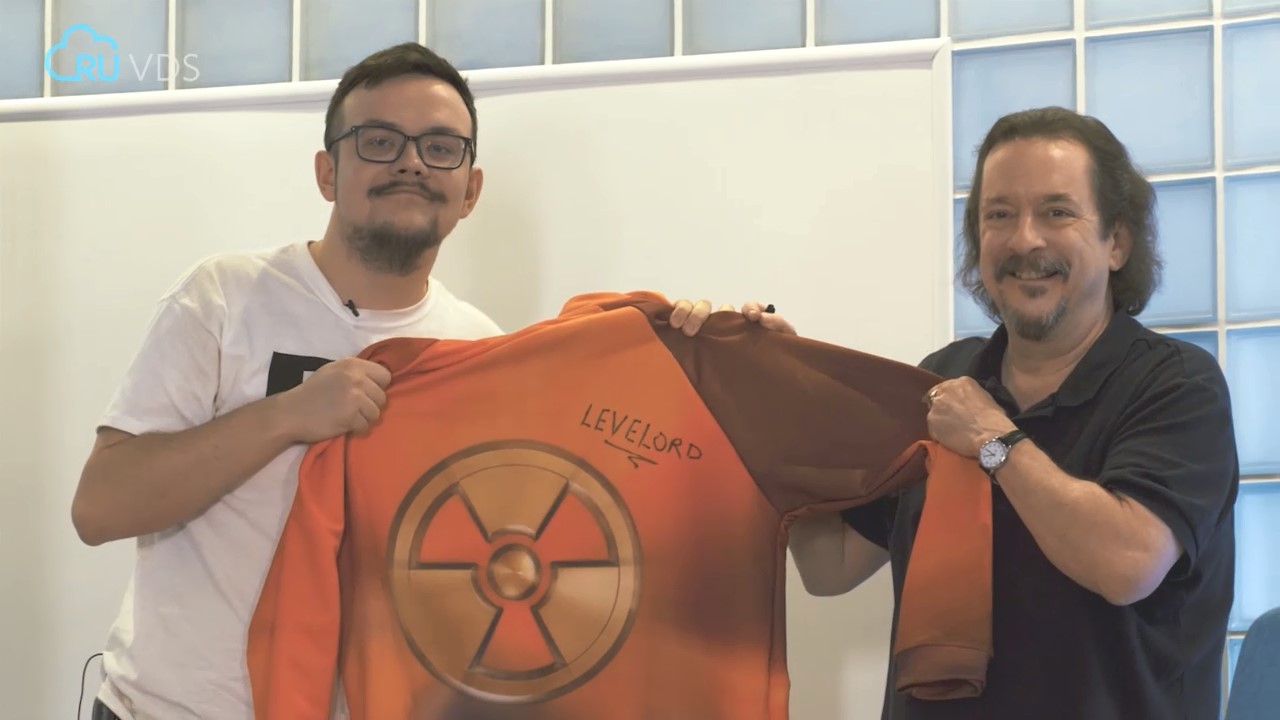
Nikolay:
I have been asked this question since the release of Duke Nukem: I want to make games, how do I get into the industry ... And I always have the same answer ... there is one and the same question to answer their question:
- If you want to be level designer, show what levels you made? Show me.
- No, I haven’t done anything yet, but I really want to be a level designer!
And I always tell them that even before I was hired somewhere, I did the levels. And I would not stop making them, even if they didn’t take me anywhere. This should be a passion. They approach me now with the same question. I ask artists: show the portfolio. I ask programmers: what mods did you make?
I love pizza, but I would not like to work in a pizzeria. Eating pizza and making pizza are completely different activities. If someone wants to make games, levels, design, code, they should already try this. There are free tools for everything. If it does not work, you need to go to study. There are great places to learn in Moscow, for example, the Higher School of Business Informatics at the Higher School of Economics. They have a good training program. There are a couple of universities in the USA where I helped launch gamedev programs.
Do not ask what to do. If you have something to show, you can show it to the company that will hire you. Or go study. But some people think that I will tell them a magical site where they click the “Yes” button and find themselves in gamedev. That doesn't work like that, of course. Most of those who want to work in the gaming industry cannot show anything - they just play games and think: oh, I will do it! I will work in a pizzeria. Or there is another example ... well, okay, I won’t talk about it. With pizza, and so it is clear.
- You are welcome.

PS We are glad to welcome Richard on Habré! You can ask him ( thelevelord ) questions in the comments.
Today we present to your attention an interview with Richard (Levelord) Gray. Levelord is the designer of the legendary games Duke Nukem, American McGee's Alice, Heavy Metal FAKK2, SiN, Serious Sam, the author of the famous phrase "You're not supposed to be here." Richard was born and spent most of his life in the United States, but a few years ago he moved to Moscow with his Russian wife and daughter.
The interview was attended by Habra editor Nikolai Zemlyansky and RUVDS managing partner Nikita Tsaplin.
→ The English version of the text and video here is


Nikolai Zemlyansky, editor of Habr.com:
Hey. My name is Nikolai Zemlyansky, I’m the editor of Habr.com, and today we’ll talk with Richard Gray, a cool, famous level designer, founder of Ritual Entertainment. Hi, Richard!
Richard Gray:
Hi.
Richard, we all know what cool things you created in gamedev - Duke Nukem levels with the Easter egg “You're not supposed to be here”, puzzles of American McGee's Alice, deathmatch mode “islands in space”, Heavy Metal FAKK 2 , SiN . I know that you even helped Croteam to create Serious Sam - this is a very popular game in Russia. What stands out for you from this list? Maybe I missed something? What do you think is the biggest?
Well, I only helped with Alice, this is a Rogue Entertainment game. Some Ritual employees assisted in development during the latest crunches. But it was their game, I only helped when it was necessary. As for Croteam - I never did anything for them. And they, in my opinion, made the coolest game in general. There is nothing but shooting and killing. No gadgets that began to appear in games then. Many guns, many ammo, many monsters. I told them this, and they put my quote on the cover. That's all I did - they made the whole game.
Can you name a game that stands out for you from the rest?
Of course, Duke Nukem is the first game I worked on. After so many years, she remains the same game. People don’t remember me, my name, but when I say “You're not supposed to be here”, they immediately: “Yes, this is the same dude!”. So Duke Nukem is my biggest and best work. And the most fun, besides.

Yes, that was cool. So, after all this presentation, let's get back to the very beginning, at a time when I might not have been born yet. How did you become interested in games? How did you get into the industry?
For me, it all started at the dawn of the 80s. I did business programs for companies. Then computers used old computer cards. You write a line of code on the map, put it in the car, write it, put it in it. Punch cards. What was happening was monitored using a simple terminal. The company where I worked bought the new HP mainframe - it was a big step forward.
There were portable disks and a monitor for every employee, including programmers - me and my boss. They bought a new Hewlett Packard mainframe, and I found a games folder there.
Among them was a game that is known as Adventure, but in general it is called Colossal Cave Adventure. It was a simple text quest, where they told you: you are in the room, the door is on the left, the door is on the right. And you chose to go right or left. Found treasures, lost in levels. It was then that I was hooked, I thought that I should do just that.
Then everyone was playing arcade machines, and Nintendo had just released its console. These were simple little games with pixel graphics. I wrote my own text quest in COBOL, which was used for business. Using ASCII art, I also made poker. But I knew that I could not seriously make computer games - for this you need to write game engines, which requires a lot of knowledge. So I went to the university to the faculty of computer engineering - I thought that this would help.
Six years later, I graduated from university and realized: knowledge is still not enough. He began to make software in one rocket and space company. Two years after this, Wolfenstein came out. It was a sensation: the first first-person shooter! A year later, DOOM came out - just a fantastic game that everyone knows about. The key point for me was the release of the DEU utility - Doom Editing Utility - which allowed everyone to create their own levels of the game. Id thought it was quite normal. You could go in and start making your own levels.

I went to the first level of the game. There you find yourself in a room with a window onto the street. You can look out of it, but you cannot get out - the window is too low. In the editor, I enlarged the window and then in the game I went out through it to the street. Oh, at that moment, as if the Lord had descended upon me! I could not believe what was happening. And so I realized that, although I can’t program, I can do such things!
The people who made the games — John Romero and others — called it level design, but there was no such thing to other people. I realized that I want to do just that. I spent all my free time - it was a real passion. I spent all free time from work on the levels, nights and weekends on level design.
Let's talk about this period in more detail. You said you sent a floppy disk with your levels in Id. What did you expect? What was the answer? How long did the answer go?
Oh, I remember that story with a laugh. By that time, for 10 years I wanted to make games, then decided that I couldn’t. But then the level design appeared - and it ignited me. If I hadn’t been hired as a game dev, I would still be able to do levels and game content, even for free.
But I had to try. I did four levels that were well rated on the CompuServe forums. I wrote them to a floppy disk, printed a letter on paper, put everything in an envelope and sent it by mail. Then there was already an e-mail, but progress has not yet reached the sending of files. I sent a letter to Jay Wilbur, CEO of Id Software. I was sure that they would not even open the envelope, because they received thousands of fan letters.
After about a week or two, I returned home from work and saw that there was a message on my phone. You know, there were such phones with a film and a light bulb that lit up when there was a message on the film. I picked up the phone to listen and almost crap: "Hello, Richard Gray, this is Jay Wilbur." Holy cow! I could not believe it.
I wrote to him what a cool Doom game, what a cool engine she has, and that if they took me to the team, we could make a version of Doom for World War II or some other. Now we know that this is only a replacement for skins, but then few people did it. Jay thanked me, said the ideas are great, but they can't do it.
Such an answer only added me enthusiasm. By that time, I was already working on the levels of the game Blood, was one foot in game dev.

Nikita:
Tell us a little about that time, for example, what was your usual working day like?
As far as I know, now everything is the same as then. All work in crunch mode. You work all day, work on the weekend. I was absolutely immersed in games, like my colleagues. At the same time, some had families! The working day began quite late, at 9-10 in the morning.
How are software developers?
Yes, as with developers, it was essentially the developers. They remained in the office until 10 pm, sometimes until midnight, they used to sleep in the office. Or rushed home, turned off for several hours, got up, took a shower and returned to work again. This could go on for a year and a half - this is the development cycle of a regular game. And the closer the end of the cycle was, the worse things got - people spent whole weeks without leaving the office. It was easier to take a nap at the workplace than to go home, then back. Cruel, but quite common for game dev. But at the same time, making games was still fun.
Today, in films and TV shows, the developers of that time are united in small project teams. How were the game developers of the time organized? Is it the same or different?
As far as I know, everything was the same. We also had small teams. Duke Nukem's core team consisted of 8 people, and another 4 to 8 people worked from time to time on contracts. All levels of Duke Nukem were made by two people. Today only twenty people can work on one level. Yes, I miss those times.
You came up with Easter eggs in games ...
No, I'm not the first to make Easter eggs. In games, they appeared in the early 70s. John Romero is very famous for his Easter eggs, hidden things. In DOOM, they are everywhere. And so did not only John, but many other level designers. But for some reason, “You're not supposed to be here” ... I did it and I don’t know why ... I once spoke with two people, even before they began to recognize me by their mustache and long hair. One says, “This is Levelord.” "Who?". “Richard Gray, Levelord” - “Who?” - “You're not supposed to be here.” “Ahhh, that one!” I don’t know how it happened. Allen had no less than Easter eggs, he hid them everywhere. But for some reason it turned out as it is.
Films were once popular, where actors played their roles, and suddenly one of them looked at the camera and winked. At the same time, they understood that they played roles in the cinema. Maybe it’s the same here, and I, the level designer, say: “I know that you are here, I know that you are not in the real world.”

It’s like ... you know, the theater has the term "fourth wall." With this phrase you punched the fourth wall.
Yes, you break through and find yourself next to the player, the way it is.

Nikolay:
Let's go back to those days. How did you come to your level design principles?
It all starts with an idea. Then you draw diagrams and other things to fix everything and explain to colleagues what you want at all. Then you make a very simplified version of the level, without lighting and with a minimum of textures. On it you check the gameplay, the player’s path, which is good, what is bad. Then you make light textures, you work out scenes. Did you mean the process of creating levels or how to come up with a level concept at all?
I meant what is important when creating a level.
This may sound like “captaincy,” but the level should be fun. This is the only thing to worry about. There are so many ways to make a level or game fun that you cannot give a more accurate description. At the upper level, the game should be fun, and at the lower level, it should work fine. If your game is built on hi-end technologies, then not all computers can stretch it. You need to think about frame rate. A game that progresses a few frames in a second cannot be fun.

But if you move away from technology ... I have two excellent, two best examples. The first is Tetris, a very old game. She's pretty darn simple, but still popular. I still play it. The second example is Angry Birds. Her "fun" mechanics are nowhere simpler. This is the simplest physics: you throw some objects, because of which others fall. Great level design. And this is not a dumb game in its simplicity. The developers have created the simplest mechanics that make levels fun. I can’t believe that there are Angry Birds-style underwear, Angry Birds animated series, Angry Birds soda. This is a great game.
Games should be fun. There are many ways to achieve this, depending on the genre of the game. If you make a shooter, as I once did, then this is like an action movie. The game usually consists of three parts - episode I, II and III. The game slowly accelerates, moves to the main action and tension, reaches its highest point and ultimately leads to victory or defeat. But in any case, the player is satisfied. If you lose, then come back and try again. If you win, you only think, “Oh my God, they didn’t dunk me!” The whole game is divided into three episodes, and each episode has the highest point - crescendo.
Each level is built in the same way. Sometimes you violate the order of things and throw the player immediately in the midst of a battle. But usually everything works as I described before. Many parameters are involved here. For example, balance is when a player passes a level, and you know that he has enough equipment, health and hassles with bad guys. You do not make the game too simple or too complicated. I often saw games in which the player wanted to fool. The developers thought about how great they did it. But the players did not like to be deceived. They wanted balanced gameplay.
I compare the game level with the restaurant. There should be a delicious meal, but the restaurant should look beautiful. If it's a Japanese restaurant, it should look like a Japanese restaurant. And the dishes should look good when they are served, create a pleasant impression even before they are tasted. The same with game levels: they should look good, you should feel that you are inside. If I make a level in Los Angeles, the player must feel that he is in Los Angeles. Or inside the apocalypse. All things must be combined.
Tell us about the atmosphere of work in those days. I know that you at 3D Realms did Duke Nukem, and right next to Id did Quake. You should have become great competitors in the market. How did you communicate with each other? Did you even talk? Were there any secrets that were revealed just now?
I'd always been the best. They themselves knew this, and therefore, I think, they did not feel any competition. They were always open, ready to help.
I remember the day when only a few months were left before the finish of Duke Nukem, and we had excellent expectations about the game. I don’t know if this can be called crunch now - I haven’t been working for 10 years. But then we worked every hour to keep the deadlines and finish the game - the faster the better.
We did not have time for socialization, but that very day the opportunity turned up - I don’t remember how - to go to Id Software. At that time, we already knew that Duke Nukem would be a good game. We went to Id and John Romero called us: “Oh guys, you must see it!” At one level of Quake, he turned on god mode. He stared one way and summoned the shambler - a big monster from Quake 1. He came up from the back, and we saw his shadow. It was real 3D modeling, not sprites. At first I thought, “Oh, how cool!” And then: "Oh hell, Duke Nukem should come out ...".

In Duke Nukem, Allen Bloom and I had a different story. If I wanted the floor to look highlighted, I had to redo the texture. We did not have light sources, we had to do everything manually. In Quake, it was enough to put a light source, and he did all the work. The transition from sprites to full 3D is, of course, cool, and John Romero is a great professional, but at that moment I had a different, simpler thought: “Damn it, I'm sitting with John Romero in the Id office, and he shows me Quake level! ” And the second voice said: "Richard, your Duke Nukem merges."
You had a lot of cool ideas, but technology could let you down ...
Yes, this happened often, and you could not do anything. For example, in Duke Nukem you only have one floor, you cannot put two floors on top of each other. But Allen Bloom found a way to outwit the game engine. In the first level, Hollywood Holocaust has a spiral staircase that leads to a room with a projector. With her help, Allen found a way to place the floor above the floor until you see both floors at the same time. Overcoming these limitations has helped Duke Nukem stand out. You thought: hell, this is the floor above the floor, it should not be so.
We did levels with a similar trick. For example, here is a room, and in every corner of it there is a hole down. You jumped into a hole and ended up in a room of the same size, but made in a different theme. And around this room there was a corridor along which you could go, see the first room, then the second room. She looked different, but was in the same place. And the whole room was four. And you fell into every room, which looked crazy from the side of the engine. The engine did not know how much, but could do such things.
You said that the work of a level designer is working with other people. Can you talk about the coolest game dev experts you've ever met?
No, I can’t, I came to the industry too early. I remember people, companies ... many of them were great, just fantastic. Here I want to go back a bit and remember Adventure - the same text quest that sowed my interest in games. At the university, I bought a Commodore 64 and several games - including Ultima IV, made by Richard Garriott. Started to play it. I had a pretty good GPA (GPA) - not perfect, but good. Six months before graduation, I started playing Ultima IV and my GPA began to slide. I could not stop and played: another level, another level ... By the time I graduated, I could barely meet the minimum requirements in terms of average score. And all because of one game.
I have met Richard Garriott several times. Yes, he lives among us, but for me he seemed to come down from heaven.

Nikita:
By the time you started Ritual Entertainment, you already had experience in the industry. What principles did you follow when you created a studio with partners?
I do not know what to say. We just made Duke Nukem, and it was barely released by the time we left 3D Realms. We thought it was a great game, but we couldn’t say for sure. We just wanted to reap the fruits of our labors. I started a star fever. I thought that I was magnificent, that I was the best and I was not well treated in 3D Realms. So I left with the other guys in my company.
When you are the boss and you have your own company, you cannot do what you want. Past experience did not help me. Making Duke Nukem was awesome, and we wanted to continue that way. My first job at Ritual Entertainment was a set of levels for Quake. He received very good reviews, and we had fun and interesting to do it. Duke Nukem only taught us how to create games, he had nothing to do with new works.
How did you combine management and level design? Before the foundation of Ritual, you did only level design, but when you already have your own company, you need to deal with management.
You constantly say that I was alone in Ritual, but there were six of us. And all were the owners of the company. At first, in addition to the owners, there was no one in the state at all. I was a simple level designer, I did not start a company. It was created by four people who left 3D Realms before the rest. I came later. I was glad that I was not burdened with management and responsibility. We had a CEO who was responsible for the business.
It turns out that you shared responsibilities in the company? You did the levels, and other team members took control?
Yes, it was. I am a bad manager, we had guys who do it much better. I do levels well, and that’s it. And I think everyone will agree that six owners from one company is a bad idea. It is like a ship with six captains. Or six popes. Only one is needed.
So, if you create a game studio, you will be the main and sole owner?
No, I’m a very poor leader and manager, I work terribly with people. I don’t think that I will ever create a company again. I myself am a company: I am a leader, I am a subordinate - there is only me. Three years when I myself made indie games - it was wonderful. No meetings, documents, meetings, rules. I did everything related to levels and art ...
No, I will never create a company again. Until someone comes to me and says: “Richard, here are five million dollars, do what you want, just create a company.” Then I will create a company. But this will not happen.
In one interview, I read that you retired from Ritual Entertainment due to organizational changes in the studio. What problems made you make this decision?
It has become too difficult for me to play and create games. I love first-person shooters. For me, this is a game where there is equipment, health and bad guys who want to reduce it to zero. That's all. That is why I loved Serious Sam so much. You had about five buttons on the keyboard and a mouse. No gadgets and other tricks that you need to use to do one thing, find another ...

The same thing with the development of games. Previously, the level was entirely made by one designer. Now there are five, ten ... and everyone is doing the same level. Artists, lighting specialists and so on. And this is not because someone wants it that way - it just became a necessity. But this alignment did not please me.
I almost did not spend money. I was alone, I had a 20-year-old car, the house was already bought out. I estimated the budget and thought: “Hmm, I have enough money to live another 20 years.” I was also 20 years older than almost all my fellow developers. I was already 50. And I thought: “No, I’m tired, I’d better go home to make my games and, in general, whatever I want.” So did.
I heard that you helped universities create programs for game level designers. What did these programs represent? Did students take exams? Did you take them?
Yes, it was in Dallas. Several developers — Genell Jackhews, John Romero, Tom Hall, and others — volunteered to help start the program. I answered questions on level design, Janell Jackays on art direction - in general, we helped them at the start. It was fun to watch the director prove to the administration: “Yes, of course, we will make money on it!” Then we seemed to have planted a time bomb, which then detonated the acceptance of applications for training.
What subjects are included in level design training?
Level design. All you need to know to make levels. The most important thing you cannot learn at home is how to do something in a team. And it doesn’t matter what exactly you study. It is very useful. I can sit at home alone and do levels, but I have no idea how to sit next to four other designers who also make my level. You need to understand that this is not my level, this is the level of the game. Classical education helps a lot here.
How to understand whether a student is ready to do levels or should he work more?
Everything is different here, as in universities, where they give you a test in physics, mathematics, and you have to give the correct answers. You make a level and show it. And you do not just do the level, you work as a team. There is a class of level designers, an art direction class, programmers, game designers ... They all come together in groups, and each group makes its own game, as far as I know. I think there are some tests as well.
When you go to study, for example, as a chef, you don’t write any tests. You cook food and show it: here, I can do it. With gamedev, everything is about the same.

Nikolay:
Знаете, многие профессионалы своего дела заканчивают карьеру тем, что учат других. Но я знаю, что несколько лет назад вы сделали уровни для новой игры Duke Nukem 3D: 20th Anniversary World Tour. Можете описать на этом примере, как делаются уровни?
Do not say Gearbox ( explanation: Gearbox Software is the developer of Duke Nukem Forever ), but I would do it for free. 20 years after the original Duke, Randy Pitchford made a deal with me and Allen Bloom, the second level designer at Duke Nukem. Lee Jackson made music, other people from the original composition of the developers also gathered - I do not remember all the names. We used the same Build engine, but already supplemented with 3D capabilities, with realistic dynamic lighting and other things. And those who want to nostalgia can play in the mode with the old version of the engine. Allen and I created levels for about a year, part-time. He did 4 levels, and I did 4 levels. From them was made a new, fifth episode of the game.
We decided to prepare a world tour of the cities that needed to be saved from aliens. Of course, I chose Moscow as the first city. And he chose ... all of his locations were in America, with the exception of one in Egypt. Los Angeles, San Francisco ... And I traveled to Europe. There was a strange feeling. We made the original Duke for a year and a half, in crunch mode, without interruptions. Some part of my brain just burned out while we were doing it. It was fun, but very difficult. And so 20 years have passed, and I'm sitting in Build again.

Allen has always been smarter than me. I usually asked him questions: "Allen, how do you do this?" Allen was sitting on the right, and I constantly turned to him. And after 20 years, sitting in a Moscow apartment, I caught myself thinking that I want to look right again and ask Allen about something. Allen in California is busy with his levels, I am in Moscow with his own, but the habits of those years tightly stuck in my head.
Previously, it was necessary to limit yourself, not to bend with sprites, level geometry. Now, working on the Build engine, you can do whatever you want. Modern computers with Build are bored, they just yawn and say: "Well, come on ..".
It was great, I had a lot of fun creating a new Duke. I have not heard anything about the sales of this game. It is on Steam, Xbox, Playstation. I expected a blockage of letters, ringing fanfare, but this did not happen. Perhaps because the technology is already out of date. Gamers know about Duke Nukem. Perhaps here is the same story as with the films. I love old films, black and white, made before my birth. But many people will not watch them precisely because they are black and white. But anyway, it was fun.
Do you do anything else after Duke Nukem? Can you help other companies with level design?
Yes, I helped design companies. When I just retired, back in Dallas I made two games with hidden objects, completely by myself. And it was a great time: no meetings, trips to work, no documents, schedules, deadlines. I could only think of games. They weren’t very cool, but considering that I did them alone ... I look around and say: "Well done, Richard, good job." And these games even brought me good money. Then my mother fell ill for a whole year. She’s better now, but then I helped her with rehabilitation and put off all things. And then bam! - and I'm already in Moscow, with my wife and daughter.
I am retired and do not do anything related to work. But sometimes I play with Unity and Unreal, I make some prototypes, purely for myself. This is my first time making an Android game. I never thought that I would do mobile games at all. I didn’t really like the platform. The screen is small, I'm old, I can’t poke my fingers fast enough. But now I think: hmm, but there is something in it. I go down the subway, go outside - people everywhere play on phones.
Now I almost do not help anyone with games. A friend of mine owns a Game Garden mobile game development company, I have helped them several times with time management games. I helped another friend with a bubble shooter. But in general, nothing serious, no development of your own game. Although ... we'll see.

Nikita:
What do you like best in Russia? Any dishes, places ... the weather?
Oh, I am often asked such questions, especially in America. And I can not choose something specific. The only thing I don't like is winter. She is very harsh. But everything else ... imagine that I left everything in my homeland in the States - family, friends. Every day I miss something that I have there. Not because there is something missing, but because here it is different, unusual. But there must be a reason why I am here? I like everything here. Russian people are super. There are, of course, bad people everywhere, but in general ... I love Russian food, I have gained 10 kilograms since I moved here.
I love Moscow. New York was my favorite city before moving, and Moscow evokes the same emotions. Not a dirty and evil city, but old and very busy, just boiling. I can’t single out one thing, in Russia I really like everything. And I would like more Russians and Americans to travel to each other. Some Russians tell me: “Oh, you are cute, American.” Yes, Americans are very nice people. And that’s all. those who come here from the United States say: “Why are there any problems with Russia at all, it’s just wonderful!” And the reasons for saying this are the same as mine: people, food, cities. It is a pity that we can not travel more often between our countries.
The problem is not even propaganda. We don’t hear bad things in Russia about America and in America about Russia. We do not hear anything. And in these conditions, we create our opinion, looking back at the politicians. I do not like politicians, they support all this shit in relationships. In any case, if there is an opportunity to go to Russia, you must definitely do it.
Last summer, the World Cup in Russia was held, and it was difficult to sit at home. Did you go to any matches?
No, we did not go to football, but went to the center, and it was beautiful. I think we supported FIFA and the championship very well. It was a funny occasion. I came from Texas, a state with great Mexican influence. I always liked Mexico - people, food, etc. Once we walked along the street in the evening, memories rolled across me in the States. Around there were groups of fans from different countries, and suddenly I heard Mexican music, and then I saw the Mexicans having fun. I felt that I had to come up and say hello, as if we were friends. These are Mexicans, I probably know one of them ...
I think we did a great job. The city looked great and in general ... I'm glad it happened.

Nikolay:
Сегодня многие ребята хотят делать игры как Джон Ромеро, но не знают, с чего начать: делать свой собственный проект или идти работать в студию. Можете дать им совет?
I have been asked this question since the release of Duke Nukem: I want to make games, how do I get into the industry ... And I always have the same answer ... there is one and the same question to answer their question:
- If you want to be level designer, show what levels you made? Show me.
- No, I haven’t done anything yet, but I really want to be a level designer!
And I always tell them that even before I was hired somewhere, I did the levels. And I would not stop making them, even if they didn’t take me anywhere. This should be a passion. They approach me now with the same question. I ask artists: show the portfolio. I ask programmers: what mods did you make?
I love pizza, but I would not like to work in a pizzeria. Eating pizza and making pizza are completely different activities. If someone wants to make games, levels, design, code, they should already try this. There are free tools for everything. If it does not work, you need to go to study. There are great places to learn in Moscow, for example, the Higher School of Business Informatics at the Higher School of Economics. They have a good training program. There are a couple of universities in the USA where I helped launch gamedev programs.
Do not ask what to do. If you have something to show, you can show it to the company that will hire you. Or go study. But some people think that I will tell them a magical site where they click the “Yes” button and find themselves in gamedev. That doesn't work like that, of course. Most of those who want to work in the gaming industry cannot show anything - they just play games and think: oh, I will do it! I will work in a pizzeria. Or there is another example ... well, okay, I won’t talk about it. With pizza, and so it is clear.
So it was Richard Gray, the famous Levelord! Thanks for your time, Richard.
- You are welcome.

PS We are glad to welcome Richard on Habré! You can ask him ( thelevelord ) questions in the comments.
